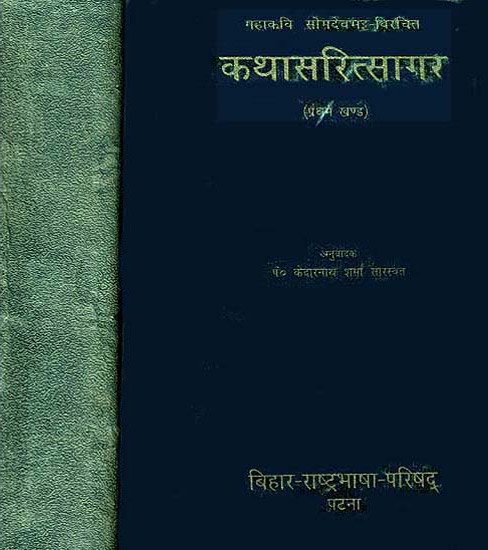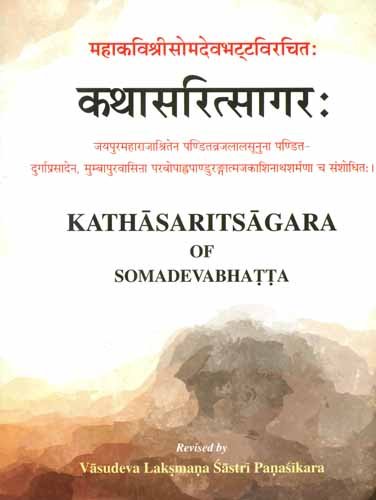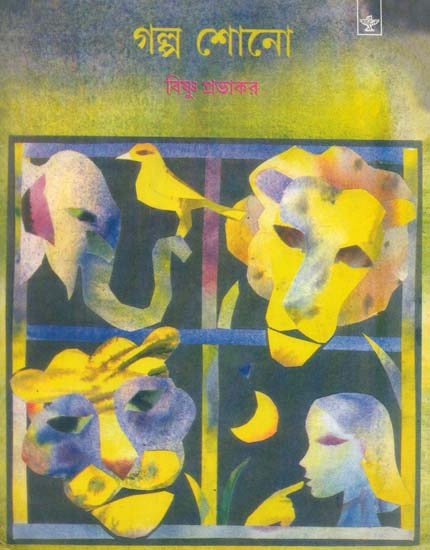Kathasaritsagara [sanskrit]
by C. H. Tawney | 2014 | 226,424 words | ISBN-13: 9789350501351
The Sanskrit edition of the Kathasaritsagara referencing the English translation and grammatical analysis. Written by Somadeva and dating from the 12th century, the Kathasaritsagara (or Katha-sarit-sagara) represents an epic legend narrating the adventures of Naravahanadatta as he strives to become the destined emperor of the Vidyadharas. Alternative titles: (Kathāsaritsāgara, कथासरित्सागर, Kathā-sarit-sāgara)
Verse 9.6.416
गत्वाल्पैश् च दिनैस् ततः स निषधान्सैन्यैः सह श्वाशुरैर् अक्षज्ञानजितं विधाय विनतं तं पुष्कराख्यं पुनः ।
धर्मात्मा कृतसंविभागमनुजं देहाद्गतद्वापरं राज्यं स्वं दमयन्त्यवाप्तिसुखितो भेजे यथावन्नलः ॥ ४१५ ॥
gatvālpaiś ca dinais tataḥ sa niṣadhānsainyaiḥ saha śvāśurair akṣajñānajitaṃ vidhāya vinataṃ taṃ puṣkarākhyaṃ punaḥ |
dharmātmā kṛtasaṃvibhāgamanujaṃ dehādgatadvāparaṃ rājyaṃ svaṃ damayantyavāptisukhito bheje yathāvannalaḥ || 415 ||
The English translation of Kathasaritsagara Verse 9.6.416 is contained in the book The Ocean of Story by C.H. Tawney. This book is available online or you could buy the latest edition:
Read online Buy now! The English translation by C.H. Tawney (2014)
Glossary of Sanskrit terms
Note: This extracts Sanskrit terms and links to English definitions from the glossary, based on an experimental segmentation of verse (9.6.416). Some terms could be superfluous while some might not be mentioned. Click on the word to show English definitions.
Alpa, Dina, Tatah, Tad, Tata, Nishadha, Sainya, Saha, Shvashura, Aksha, Jnana, Jit, Jita, Vidha, Vinatam, Vinata, Pushkarakhya, Puna, Dharmatman, Krita, Samvibhaga, Anuja, Deha, Gata, Dvapara, Rajya, Sva, Damayanti, Damayat, Sukhita, Yathavat, Nala,
Analysis of Sanskrit grammar
Note: this is an experimental feature and only shows the first possible analysis of the Sanskrit text (Kathasaritsagara Verse 9.6.416). If the system was successful in segmenting the sentence, you will see of which words it is made up of, generally consisting of Nouns, Pronouns, Verbs, Participles and Indeclinables. Click on the link to show all possible derivations of the word.
- Line 1: “gatvālpaiś ca dinais tataḥ sa niṣadhānsainyaiḥ saha śvāśurair akṣajñānajitaṃ vidhāya vinataṃ taṃ puṣkarākhyaṃ punaḥ ”
- gatvā -
-
√gam -> gatvā (absolutive)[absolutive from √gam]√gam -> gatvā (absolutive)[absolutive from √gam]√gam -> gatvā (absolutive)[absolutive from √gam]
- alpaiś -
-
alpa (noun, masculine)[instrumental plural]alpa (noun, neuter)[instrumental plural]
- ca -
-
ca (indeclinable conjunction)[indeclinable conjunction]ca (noun, masculine)[compound], [vocative single]ca (noun, neuter)[compound], [vocative single]
- dinais -
-
dina (noun, masculine)[instrumental plural]dina (noun, neuter)[instrumental plural]
- tataḥ -
-
tataḥ (indeclinable adverb)[indeclinable adverb]tataḥ (indeclinable correlative)[indeclinable correlative]tataḥ (indeclinable)[indeclinable]tad (noun, neuter)[ablative single], [ablative dual], [ablative plural]tata (noun, masculine)[nominative single]√tan -> tata (participle, masculine)[nominative single from √tan class 8 verb]sa (noun, masculine)[ablative single], [ablative dual], [ablative plural]sā (noun, feminine)[ablative single], [ablative dual], [ablative plural]
- sa -
-
sa (noun, neuter)[compound], [vocative single]sa (noun, masculine)[nominative single]
- niṣadhān -
-
niṣadha (noun, masculine)[accusative plural]
- sainyaiḥ -
-
sainya (noun, masculine)[instrumental plural]sainya (noun, neuter)[instrumental plural]
- saha -
-
saha (indeclinable postposition)[indeclinable postposition]saha (noun, masculine)[compound], [vocative single]saha (noun, neuter)[compound], [vocative single]√sah (verb class 1)[imperative active second single]
- śvāśurair -
-
śvāśura (noun, masculine)[instrumental plural]śvāśura (noun, neuter)[instrumental plural]
- akṣa -
-
akṣa (noun, masculine)[compound], [vocative single]akṣa (noun, neuter)[compound], [vocative single]√akṣ (verb class 1)[imperative active second single]
- jñāna -
-
jñāna (noun, neuter)[compound], [vocative single]
- jitam -
-
jita (noun, masculine)[adverb], [accusative single]jita (noun, neuter)[adverb], [nominative single], [accusative single]jitā (noun, feminine)[adverb]jit (noun, masculine)[accusative single]√ji -> jita (participle, masculine)[accusative single from √ji class 1 verb], [accusative single from √ji class 9 verb]√ji -> jita (participle, neuter)[nominative single from √ji class 1 verb], [accusative single from √ji class 1 verb], [nominative single from √ji class 9 verb], [accusative single from √ji class 9 verb]
- vidhāya -
-
vidha (noun, masculine)[dative single]vidha (noun, neuter)[dative single]
- vinatam -
-
vinatam (indeclinable)[indeclinable]vinata (noun, masculine)[adverb], [accusative single]vinata (noun, neuter)[adverb], [nominative single], [accusative single]vinatā (noun, feminine)[adverb]
- tam -
-
ta (noun, masculine)[adverb], [accusative single]ta (noun, neuter)[adverb], [nominative single], [accusative single]tā (noun, feminine)[adverb]tan (noun, masculine)[adverb]sa (noun, masculine)[accusative single]
- puṣkarākhyam -
-
puṣkarākhya (noun, masculine)[adverb], [accusative single]
- punaḥ -
-
pu (noun, neuter)[ablative single], [genitive single]puna (noun, masculine)[nominative single]pū (noun, neuter)[ablative single], [genitive single]
- Line 2: “dharmātmā kṛtasaṃvibhāgamanujaṃ dehādgatadvāparaṃ rājyaṃ svaṃ damayantyavāptisukhito bheje yathāvannalaḥ ”
- dharmātmā -
-
dharmātman (noun, masculine)[nominative single]
- kṛta -
-
kṛta (noun, masculine)[compound], [vocative single]kṛta (noun, neuter)[compound], [vocative single]√kṛ -> kṛta (participle, masculine)[vocative single from √kṛ class 1 verb], [vocative single from √kṛ class 2 verb], [vocative single from √kṛ class 5 verb], [vocative single from √kṛ class 8 verb]√kṛ -> kṛta (participle, neuter)[vocative single from √kṛ class 1 verb], [vocative single from √kṛ class 2 verb], [vocative single from √kṛ class 5 verb], [vocative single from √kṛ class 8 verb]√kṛ (verb class 1)[injunctive middle third single]√kṛ (verb class 2)[imperative active second plural], [injunctive middle third single]√kṛ (verb class 5)[injunctive middle third single]√kṛ (verb class 8)[injunctive middle third single]
- saṃvibhāgam -
-
saṃvibhāga (noun, masculine)[adverb], [accusative single]
- anujam -
-
anuja (noun, masculine)[adverb], [accusative single]anuja (noun, neuter)[adverb], [nominative single], [accusative single]anujā (noun, feminine)[adverb]
- dehād -
-
deha (noun, masculine)[adverb], [ablative single]deha (noun, neuter)[adverb], [ablative single]
- gata -
-
gata (noun, masculine)[compound], [vocative single]gata (noun, neuter)[compound], [vocative single]
- dvāparam -
-
dvāpara (noun, masculine)[adverb], [accusative single]
- rājyam -
-
rājya (noun, masculine)[adverb], [accusative single]rājya (noun, neuter)[adverb], [nominative single], [accusative single]rājyā (noun, feminine)[adverb]√rāj -> rājya (participle, masculine)[adverb from √rāj]√rāj -> rājya (participle, neuter)[adverb from √rāj]√rāj -> rājyā (participle, feminine)[adverb from √rāj]√rāj -> rājya (participle, masculine)[accusative single from √rāj class 1 verb], [accusative single from √rāj]√rāj -> rājya (participle, neuter)[nominative single from √rāj class 1 verb], [accusative single from √rāj class 1 verb], [nominative single from √rāj], [accusative single from √rāj]
- svam -
-
sva (noun, masculine)[adverb], [accusative single]svan (noun, masculine)[adverb]svan (noun, neuter)[adverb]sva (noun, neuter)[nominative single], [accusative single]
- damayantya -
-
damayantī (noun, feminine)[compound], [adverb], [nominative single], [vocative single]√dam -> damayantī (participle, feminine)[compound from √dam], [adverb from √dam]√dam -> damayat (participle, neuter)[nominative dual from √dam], [nominative plural from √dam], [vocative dual from √dam], [vocative plural from √dam], [accusative dual from √dam], [accusative plural from √dam]√dam -> damayantī (participle, feminine)[nominative single from √dam], [vocative single from √dam]√dam (verb class 0)[present active third plural]
- avāpti -
-
avāpti (noun, feminine)[compound], [adverb]
- sukhito* -
-
sukhita (noun, masculine)[nominative single]√sukh -> sukhita (participle, masculine)[nominative single from √sukh class 10 verb]
- bheje -
-
√bhaj (verb class 1)[perfect middle first single], [perfect middle third single]
- yathāvan -
-
yathāvat (indeclinable)[indeclinable]
- nalaḥ -
-
nala (noun, masculine)[nominative single]
Other editions:
Also see the following editions of the Sanskrit text or (alternative) English translations of the Kathasaritsagara Verse 9.6.416
Kathasaritsagar
by Kedarnath Sharma Saraswat (2005)
The Only Edition with the Sanskrit Text and its Hindi Translation (An Old and Rare Book) Set of 3 Vol.
Buy now!
Kathasaritsagara of Somadeva Bhatta (Sanskrit Text Only)
by Vasudeva Laksmana Sastri (2013)
Katha Sarit Sagar in Marathi
by H. A Bhave (1995)
Set of 5 Volumes; Published by Varada Books, Pune. 2256 pages (Throughout B/W Illustrations).
Buy now!
Katha Sarit Sagara (Tamil)
by S. V. Ganapati (எஸ். வி. கணபதி) (2014)
[கதா சரித் சாகரம்] Published by Alliance Publications.
Buy now!
Galpa Shono
by Abhijit Chattopadhyay (2014)
[গল্প শোনো] Galpa Shono: Bengali Translation of 'Suno Kahani From Katha Sarit Sagar'; 9788126015436; Published by Sahitya Akademi, Delhi.
Buy now!Preview of verse 9.6.416 in Bengali sript:
গত্বাল্পৈশ্ চ দিনৈস্ ততঃ স নিষধান্সৈন্যৈঃ সহ শ্বাশুরৈর্ অক্ষজ্ঞানজিতং বিধায বিনতং তং পুষ্করাখ্যং পুনঃ ।
ধর্মাত্মা কৃতসংবিভাগমনুজং দেহাদ্গতদ্বাপরং রাজ্যং স্বং দমযন্ত্যবাপ্তিসুখিতো ভেজে যথাবন্নলঃ ॥ ৪১৫ ॥
![Kathasaritsagara [sanskrit] - book cover](/uploads/a/Katha-Sarit-Sagara.jpg)




